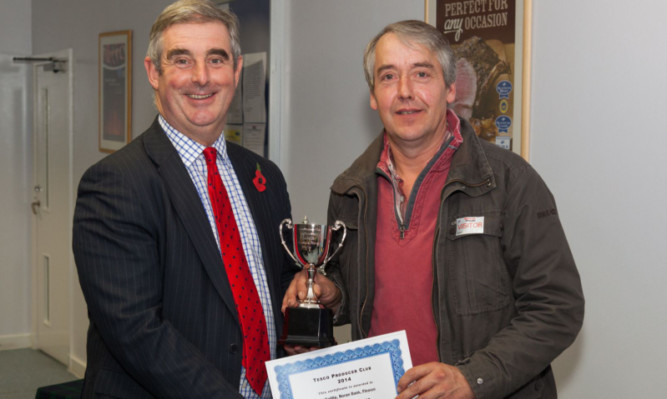Beef producers have been warned to meet specification to the letter when sending cattle to abattoirs or face stiffer penalties for non-compliance.
McIntosh Donald site director Alan McNaughton, speaking at the company’s annual prize giving ceremony at Portlethen, admitted that abattoirs had not been able to fully impose penalties on carcases which were overfat or overweight or failed to meet the criteria for the Scotch label because of the need to maintain factory throughput at a time of cattle shortages.
But the industry was facing a new era with supply and demand much more in balance, and abattoirs were now in a position to introduce a price differential between carcases meeting spec and those out of spec.
He was speaking after facing a barrage of criticism from producers for the proposed introduction of a penalty of 20p/kg from Monday for cattle which did not fully meet the conditions to label beef as Scotch.
Following a complaint by a farmer to the Advertising Authority 10 years ago, Scotland’s quality assurance scheme demands that all beef carrying the Scotch label must come from cattle born and reared throughout their life on a quality assured farm in Scotland, rather than simply having been fed on an approved farm over the previous 90 days which used to be the rule.
But producers have continued to supply cattle either bred or reared for a period on a non-assured farm without penalty.
The problem is that cattle may have been bred on a quality assured farm but may be sold on to a non-approved farm before being sold again for finishing on an approved farm.
Producer Alan Meston, Chapelton, Stonehaven, echoed the view of many producers when he suggested farmers needed more time to adjust.
“I’m happy to meet the requirement, but many of us are sitting with cattle which may not meet the requirement and have been given no advance warning of the imposition of this penalty,” he said.
“This is going to cost producers dearly. We should have been given at least six months’ notice of the proposed change.”
But Mr McNaughton was unrelenting as it was also costing the factory in lost premium.
However, he said he would look at the timing of the introduction of the penalty in the light of producers’ concerns.
“The fact is that we get no leeway from our retail customers,” Mr McNaughton said. “If we don’t deliver beef which meets the spec 100% or at worst 99.5% we get it returned. So the cattle we buy must also meet the spec.”
More cattle meeting spec would mean the plant could operate more profitably and the company would be in a position to pay more for cattle meeting their requirements. “It is a win-win situation for everyone,” he said.
Heifers were a particular problem, and some weeks up to 30-40% supplied to Portlethen were out of spec because of overfatness.
This could be rectified, he suggested, by farmers feeding steers and heifers differently.
Harbro technical director Willie Thomson advocated a split feeding regime, with heifers fed a lower-starch and higher-protein diet to grow them on before going on to a finishing diet.
Mr McNaughton said overweight cattle were a huge problem, although the position was improving after the introduction of a penalty for carcases above 420kg.
“But our ideal carcase is 360kg to 380kg so we should be penalising anything over 380kg,” he said. “Weight of carcase is crucial to the viability of the factory as the right weight means all parts of the carcase can be readily sold.”
Procurement director John Dracup, from parent company 2 Sisters, backed up Mr McNaughton’s comments and said the company had learned from experience that the only way to get producers to change their ways was to hit them in the pocket.
He warned that overfat carcases hitting 4H classification may face higher penalties in the future.
“We need to communicate more effectively with producers to discuss why these changes are necessary,” he admitted.
“We will pay a good price for carcases which meet our spec and the requirements of our retail customers for lean beef.”
Mr McNaughton, who is also president of the Scottish Association of Meat Wholesalers, said Scotch beef was facing a problem of consumer resistance because of the huge premium over English and Irish cattle prices.
“We can live with a premium of 10p/kg, but Scotch beef is the dearest in the world with a premium at present of 29p/kg liveweight over England and Wales and 95p over Ireland,” he said.
“This is unsustainable and further highlights the need for meeting specification to make sure the beef we produce justifies the premium paid for it.”
McIntosh Donald account for 18% of Scotland’s slaughter cattle, with an annual throughput of 76,000 cattle. Most goes to Tesco, which is Scotland’s biggest customer for beef.
Meanwhile, the winners of the McIntosh Donald awards for the best grading cattle to be supplied over the past year were presented with their trophies and prize money as follows.
Steers: 1 JA Baillie, Noranbank, Finavon, Forfar; 2 J Sharp, Ledmuir, Menmuir, Brechin; 3 K Stewart & Son, Cocklarachy, Huntly.
Heifers: 1 Balfour Mains, Shapinsay, Orkney; 2 J & AA Mitchell, Newton, Newhills, Bucksburn; 3 WA Fettes, Braes of Enzie, Buckie.
Lambs: 1 D & A Clark, Purgarvie, Lintrathen, Kirriemuir; 2 David Petrie & Son, Balladrum, Durris, Banchory; 3 Scott & Brown, Biggings, Stenness, Orkney.
Aberdeen-Angus: AH Mackay, West Greenland, Castletown, Thurso.
Organic cattle: Brian Ridland, Alkerness, Evie, Orkney.
Organic lamb: JS Baird & Sons, Scotston, Auchterhouse.
